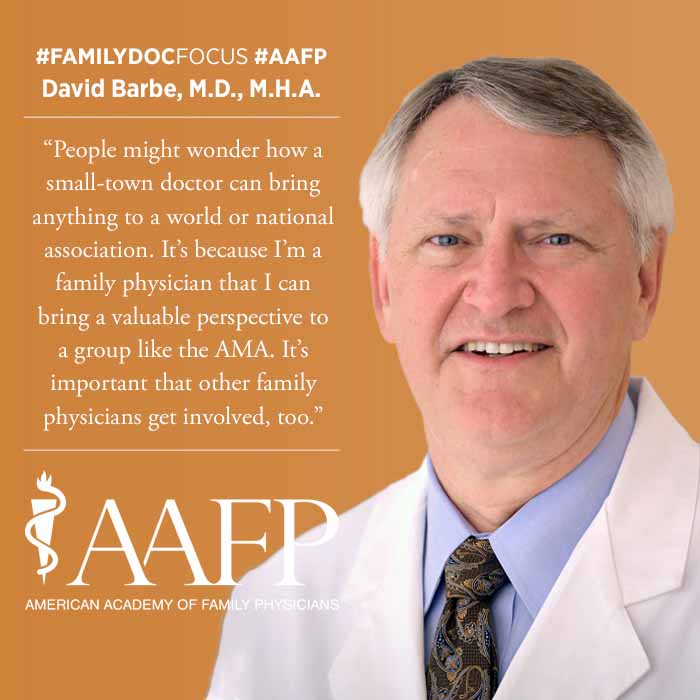Small-town FP Takes on National, Global Leadership Roles
November 25, 2019 01:04 pm David Mitchell – David Barbe, M.D., M.H.A., and his wife, Debbie Barbe, R.N., didn't have hard decisions to make about their career paths when he completed his residency training in Wichita, Kan., in 1983.
The high school sweethearts moved back to their hometown, Mountain Grove, Mo., and started a family medicine clinic.
"It's a chronically underserved area," Barbe said. "Coming back not only got us closer to family, it satisfied our desire to serve in an area of great need."
Mountain Grove's population is less than 5,000, but it's the largest town in a 50-mile radius. Barbe practiced full-scope family medicine, including obstetrics and procedures, and saw patients at two area hospitals for roughly 25 years.
Barbe's solo rural practice eventually expanded to include two sites and several physicians before it merged with Springfield, Mo.,-based Mercy, a 650-physician, multispecialty, integrated health system. Barbe serves as vice president of regional operations for Mercy, with responsibility for four hospitals, 70 clinics and more than 200 physicians and advanced practitioners.
Barbe was still a new physician building his then-independent practice when a colleague who was moving out of the state asked if Barbe was interested in taking his seat on the Missouri State Medical Association Board of Directors. Facing increasing interference from payers in the form of things like formulary restrictions and prior authorization requirements, he jumped at the opportunity.

"There were decisions being made outside the exam room impacting my practice," he said. "If I was going to have influence on the care of my patients, I needed to get involved. Family physicians have to be involved at the state and national level to address these types of problems."
Barbe served on the MSMA Board for more than 25 years, including in roles as president and chair. He also served as a state delegate to the AMA for 20 years. At the national level, Barbe served two terms on the AMA Council on Medical Service, including as chair from 2008 to 2009. He then served for a decade on the AMA Board of Trustees, including as Board chair and later AMA president in 2017-18.
Barbe said the AAFP and its state chapters play important roles in representing family medicine -- including in the AMA House of Delegates -- but he added that family physicians also should consider taking active roles in state and national physician groups that aren't specific to one specialty.
"Family physicians make good leaders because we see the big picture," he said. "We have a broad scope of medical knowledge and we have a significant focus on patient-centered care."
Recently, Barbe was named president-elect of the World Medical Association, an organization that represents millions of physicians from more than 100 countries through national organizations like the AMA.
"People might wonder how a small-town doctor can bring anything to a world or national association," he said. "It's because I'm a family physician that I can bring a valuable perspective to a group like the AMA. It's important that other family physicians get involved, too."
The WMA creates policies on a wide range of issues, including medical ethics, public health and medical education, that member organizations can take back to their individual countries.
"We can learn a lot from other countries and how they administer their health systems," he said.
Although his leadership role has expanded to a global footprint, Barbe still cares for patients in Mountain Grove.
"Physicians can have a significant impact in a rural community," he said. "You're sort of a big fish in a small pond because the community looks to you for lots of things beyond health care. You can be anonymous in a place like St. Louis. In Mountain Grove, you see your patients at the grocery store and at church. For me, that was a way to impact not only their health, but their lives."